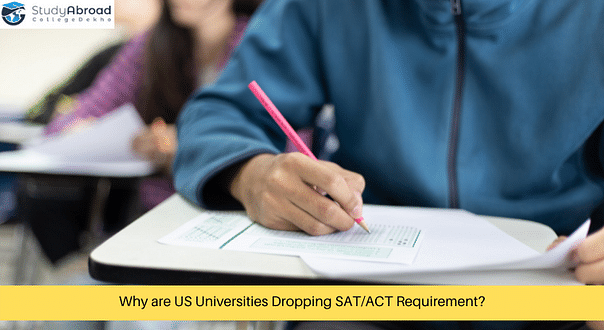More than 80% of the US universities that grant bachelor's degree admissions do not require SAT/ACT scores for admissions. Many colleges and universities went test-optional during the advent of Covid-19 to accommodate applicants, and the shift from standardised tests has now become a common norm among them. Statistics from National Center for Fair and Open Testing reveal that more than 1800 US universities have made it either SAT/ACT optional or have adopted test-blind/score-free policies.
In 1969, Bowdoin College was the first one to make standardised tests optional. Now, the majority of the admission committees are making selection decisions without considering SAT or ACT results. These scores nullify the importance of the scores and understand that they do not testify “academic merit”. All eight Ivy League colleges and many elite and several liberal arts colleges have also ended the use of SAT or ACT scores. Other schools have decided to remain test-optional for at least the 2023 Fall cycle. Before, delving deep into the analysis of the reasons why many US universities are not accepting standardised scores, students must understand the meanings of test-optional, test blind and test-flexible colleges.
Test Optional, Test Blind, Test Flexible Colleges - Whats the Difference?
Before we get to the big question, heres what we need to know what test-optional, test-blind, test-flexible colleges actually mean.
Test Optional Colleges: Simply put, test-optional colleges allow students to decide whether or not they wish to appear and send SAT and ACT scores. These colleges will consider their SAT or ACTscores for admission but those submitting standardized test scores will not be given priority over those not doing so.
Test Blind Colleges:Colleges that have gone test blind will not consider an applicants ACT or SAT scores for their admission evaluation even if they submit it.
Test Flexible: A test-flexible college allows students to submit scores of other tests instead of the SAT or ACT such as an International Baccalaureate exam, one or more SAT Subject Tests or an Advanced Placement test.
Our Ivy League mentors are endowed with years of experience to get international students admitted to thetop universities in the USA. They further assist students with preparing LORs, SOPs, US visa interviews and so on.
Is Your Dream University AcceptingSAT/ACT Scores?
Why Many US Colleges are Going Test Optional?
College Board data show that nearly 2.2 million high school graduates took the SAT in 2019, up from 2.1 million in 2018 and over 1.7 million students took the ACT in 2019, a drop from 1.9 million in 2018. Even so, thousands of top universities in USA now have chosen not to review ACT/SAT scores for admissions to undergraduate studies. Before finding out what colleges don't require sat or act for class of 2023 Let us find out whytest-optional colleges for international students started in the first place.
Racial and Economic Biases
Chief complaints filed by testing critics hold that these standardised tests are racially biased and put wealthy students at an advantage. According to a 2019 lawsuit, standardised testing is biased against the poor and mainly Hispanic and Black students. Data show that in 2018, combined scores for White and Asian students averaged 1100+, while other groups averaged below 1000. With regard to income, an analysis conducted in 2015 found that students with family income above USD 200,000 scored highest while those with family income less than USD 20,000 scored lowest. Critics are of the view that if universities stop reviewing ACT/SAT scores, it would correct inequities faced by students from these backgrounds.
Increase in Enrollment and Overall Applications
As per data collected from 28 institutions in the US, a study found that test-optional colleges witnessed an increase in overall applications. When the University of New England went test-optional in 2019, it recorded the highest number of enrollments in its history with a 13% increase from the previous year. The University of California at Los Angeles reported an increase of 30% in international freshman admission since 2020. Yale University witnessed an increase in 99% of the international applications.
Impact on Rankings
An increased number of applicants lead to a lower acceptance rate, which further results in a higher ranking. Also, only applicants with high scores on the ACT and/or SAT would report the scores, which will inflate the average test scores for the schools.
Fairness
Critics often argue that standardized testing does not ensure fair enrolment and equal opportunity. Dropping SAT and ACT scores would not just be reliable in identifying students who have the potential to succeed but would also ensure more fairness to all applicants. If a student has a good academic record in high school, they might not have to submit their SAT or ACT scores to stand out.
Impact on Diversity
New research, based on simulations using real student applications at competitive institutions, found that dropping the requirement would lead to considerable gains in the percentage of Latino and black students and other racially and ethnically underrepresented groups as well as economically disadvantaged students. The gains are higher for those that have decided to drop the requirement entirely, as opposed to those that have gone test-optional.
A Poor Predictor of College Success
Students often tend to believe SAT and ACT scores are the deciding factors in an undergraduate admissions decision. However, they are only one aspect of their application, apart from grades earned in high school, community involvement, participation in sports and extracurricular activities and so on. Education experts believe that the most significant predictor of academic success in undergraduate studies is a students high school performance.
In fact, standardized tests provide very little incremental value beyond a student's high school GPA. A study also revealed that going SAT and ACT optional would lead to classes for students with higher GPAs and dropping the test entirely would result in higher levels of achievement in college.
List of Test OptionalColleges for 2023-24 Admissions
Given below is the list of some of the US colleges that don't require SAT/ACT scoresin 2023-24 admissions:
|
University |
Test-Optional/Test-Flexible/Test-Blind |
| Harvard University | Test-Optional Until 2026 |
| Princeton University | Test-Optional Until 2023 |
| Davidson College | Permanently Test-Optional |
|
Test-Optional for Spring 2023, Fall 2023, Spring 2024 |
|
|
Albertus Magnus College |
Test-Optional permanently |
|
Test-Optional permanently |
|
|
Agnes Scott College |
Test-Optional permanently |
|
Test-Optional permanently |
|
|
Test-Optional for2023 |
|
|
Test-Optional permanently |
|
|
Test-Optional permanently |
|
|
Test-Optional for 2023,2023 |
|
|
Coastal Carolina University |
Test-Flexible permanently (must have 3.5+ GPA) |
|
Test-Optional for 2023, 2024 |
|
|
Test-Optional for 2023, 2024 |
|
|
Test-Optional permanently |
|
|
Test-Optional for 2023 |
|
|
Test-Optional for 2023 |
|
|
Test-Optional permanently |
|
|
Test-Blind permanently |
|
|
Test-Optional permanently |
|
|
Test-Optional for 2022-2023 |
|
|
Test-Optional permanently |
|
|
Test-Optional for 2023 |
|
|
Test-Flexible permanently (must have 2.7+ GPA) |
|
|
Test-Optional for 2023 |
|
|
Test-Optional permanently |
|
|
Test-Optional permanently |
|
|
Test-Flexible permanently (must have 3.0+ GPA or rank in top half of class) |
|
|
Test-Optional permanently |
|
|
Test-Optional under review for 2023 |
|
|
Test-Optional for 2023-24 |
|
|
Test-Optional for 2023 |
|
|
Test-Optional permanently |
|
|
Test-Blind permanently |
|
|
University of California system |
Test-Blind for 2023, 2024 |
|
Test-Optional for 2023 |
Research by ACT Inc, administrator of ACT, showed that many schools will continue with their test-optional policy even after the Covid-19 pandemic comes to an end. Also, as mentioned, dropping SAT and ACT testing as admissions criteria has long been in the picture and they have also drawn quite the criticism for promoting bias and so on. However, the College Board has announced that it will take measures to make the SAT more flexible.
Will Universities Re-instate SAT/ACT Scores?
MIT is one of the top US universities that has reinstated SAT/ACT scores criteria for admission to Bachelors in 2022-2023. The highly technical nature of its curriculum has made MIT reverse the earlier decision to suspend the use of standardised scores.
The non-profit organisation ACT which administers the test said that the test scores aid in improving admission decisions and also help to determine student support and placement. Priscilla Rodriguez, vice president of College Readiness Assessments at the College Board, commented that contrary to elite resources like extracurriculars and legacy status, SAT is "available to all students".
However, the majority of the schools will remain test-optional or test-blind for 2023 admissions. It is suspected that some other universities will follow in the footsteps of MIT.
Admissions to US colleges is not one size that fits all. Each school has its set standards to admit students. Though standardised scores were an important determining factor for admission, more than 1,800 institutions have now ditched the requirements. Earlier test scores were intended for unbiased and standard comparison but over time it has been related to anxiety and discrimination. This has resulted in several colleges eliminating the need for test scores.
Are you looking to study at one of the USA's top universities? Then look no further! Find out the best universities and courses in the USA with the help of our Study Abroad Expert team.
Have Further Queries Regarding SAT/ACT Requirement?

























